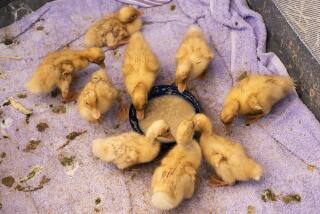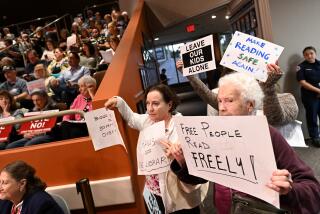Rubber Duckie Plea Fails to Sway Council to Let Tame Birds in Pond
- Share via
Manhattan Beach City Councilwoman Pat Collins populated her corner of the City Council dais with ducks Tuesday evening. They were a fanciful, toy flock she brought in a shopping bag.
A large duck doll wore a dress of appropriate holiday red. Another came as a candy dish, and there was even a yellow rubber duckie.
The toys were the councilwoman’s silent supporters as she tried to persuade her colleagues to again permit some white domestic ducks at the Polliwog Park pond, which is undergoing a thorough cleaning and rebuilding.
“I want to maintain the spirit of children feeding the ducks and of people who want to go down to ponder and see the ducks,” Collins said.
But while the rest of the council found Collins’ ploy amusing, no one backed her proposal.
The majority of the council approved a new Polliwog pond animal policy aimed at returning the park to what it was intended to be--a habitat for migratory water fowl passing by on the Southern California flyway.
Only migratory and transient wildlife may take up residence under the new rules, and nature talks and tours on the park’s ecosystem and animal life will be conducted.
Councilman Bob Holmes said it was the overpopulation of domestic ducks--and their prolific production of excrement--that polluted the pond and made reconstruction necessary. Collins, however, said she wasn’t talking about 60 or 80 ducks, but maybe a dozen.
Collins’ call for some domestic animals at the pond stems from September’s furor over the killing of 83 ducks and geese by Los Angeles County animal control officers. The birds had to be removed so the pond could be rebuilt, and there was concern that they could carry diseases from the buildup of bacteria in the pond, city officials said. Three escaped the killing and were rounded up later. They are now kept in a pen at the city maintenance yard.
Recalling the furor in September, Collins said, “We had duck fever and I was the mayor who received the duck letters from children” saddened by the deaths of their feathered friends.
Collins contended the city gave its implied commitment to return some domestic ducks to the pond, but city staff members said there were no guarantees and the council later called for development of an animal policy.
Once a part of the natural marsh system that stretched from the harbor area to Marina del Rey, the pond became a major feature of the 18.5-acre park that opened in 1976 at Manhattan Beach Boulevard and Redondo Avenue.
The city envisioned it as a stopping off point for migratory waterfowl, such as ducks, geese, herons and egrets. Jim Stecklein, city parks and recreation director, said it was intended to provide an inland water experience for children and other park visitors.
But within a few years, domestic white ducks began appearing, presumably dumped by people getting rid of noisy pets. They, in turn, multiplied, sometimes breeding with the wild birds. Stecklein said that at times, there were as many as 200 ducks at the pond.
The newly adopted policy prohibits feeding or abandoning animals at the park, neither of which has been illegal before. One of the council’s arguments against Collins’ proposal is that a few domestic ducks will encourage the abandonment of more. “They’ll prime the pump,” Holmes said.
Stecklein concedes that some dumping probably will still occur because the park is not fenced. The policy, however, provides for immediate removal of any domestic animals, which would be relocated to several designated places, including Los Angeles city and county parks and Harbor Lake in Harbor City. Any domestic waterfowl eggs found in regular inspections of the park will also go.
The $426,000 pond rehabilitation program, expected to be completed shortly after Christmas, has included dredging and removal of accumulated material on the bottom of the pond, installation of a cement bottom and border around the pond, and relandscaping.
Stecklein said the old pond had a clay bottom that could not be cleaned, unlike the new cement bottom.
The city Parks and Recreation Commission held two public forums in connection with development of the animal policy. Both were poorly attended, which officials found surprising because of the outcry over killing the ducks in September.
Stecklein said, however, that those who spoke overwhelmingly favored making Polliwog a natural habitat, rejecting an alternate proposal to mix wild and domestic birds. The commission also recommended the policy the council adopted.
While rejecting Collins’ plea on behalf of the familiar white quackers, the council held the door open for another look in the future.
Said Holmes: “I’m not proposing we have a sterile park. If it doesn’t become a Motel 6 for migratory birds, then we can throw in some domestics.”
More to Read
Sign up for Essential California
The most important California stories and recommendations in your inbox every morning.
You may occasionally receive promotional content from the Los Angeles Times.













